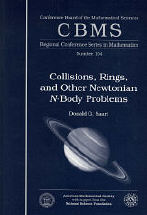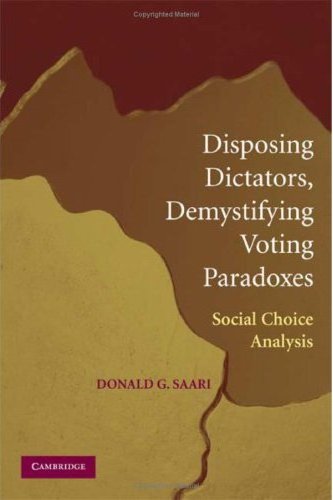Don Saari's Home Page
|
|
Institute for Mathematical Behavioral Sciences 2123 SSPA and PERSONAL INFORMATION Personal information , such as an abbreviated CV and a description of some of my background is available here.
|
Institute for Mathematical Behavioral Sciences
Without question, this is one of the more exciting periods in history to be a
mathematician! Just think about all of the advances that have been made, the
number of major problems solved within the last couple of decades, the new
directions being pioneered. In addition, in recent years other academic areas
have become mathematically more sophisticated; as such, expect them to
introduce new, unusual, and unexpected mathematical structures and questions.
This has been the case with the physical sciences, and it now is happening in
the behavioral and social sciences.
One of the goals of the Institute for Mathematical Behavioral Sciences is to
enhance these mathematical connections and extract the new mathematical
structures while helping to advance these behavioral and social sciences. If
you wish to learn more about the active conference, colloquia and seminar
series we are planning in these directions, please contact us IMBS. Even better, how about joining in with
us?
A popular item on my old webpage when I was at Northwestern University was a description of an experience I had when teaching a class of fourth graders! For those that are interested, the link to this article is given here.
-------------------------------------------------------------------------------------------------
2008 MATH AWARENESS MONTH
Here are two non-technical quicktime movies that I made for the 2008 Math Awareness Month, which has the theme of Mathematics of Voting.
The first one is an introductory lecture indicating how mathematics plays a central role in understanding whether the "will of the voters" is, indeed, respected with our voting systems. Beware: after watching this lecture, be prepared to worry whether the "correct person won" in the last election of importance to you, whether it was for a chair of your group or the vote in a primary.
We all have seen voting paradoxes, but where do they come from? This lecture shows how to create a wide selection of them. After this lecture, you should be able to create some surprising results using nothing that is mathematically difficult.
Current research interests
|
|
|
Recent books
Decisions and Elections; Explaining the Unexpected, Cambridge University Press, 2001. A problem with voting theory is that it is full of “impossibility theorems.” This book shows that they do not mean what we have generally thought they meant. For instance, it is shown how Arrow’s Theorem has a benign interpretation.
The Way it Was, AMS. 2004, This book describes the early years of the AMS as described by early articles in the Bulletin. Some of these reprinted articles are by Poincare, Hilbert, etc.
|
------------------------------------------------------------------------------------------------------------------------------------------------
Some recent preprints
My research interests concern Dynamical Systems and its applications to the physical and social sciences. A selection of my recent preprints, given below, are divided according to subject area. The general topics are
- Voting, social choice, and decision theory (which includes Arrow's Theorem, etc.),
- Evolutionary game theory and applications to the social sciences , and
- Dynamical systems and celestial mechanics.
- Statistics




